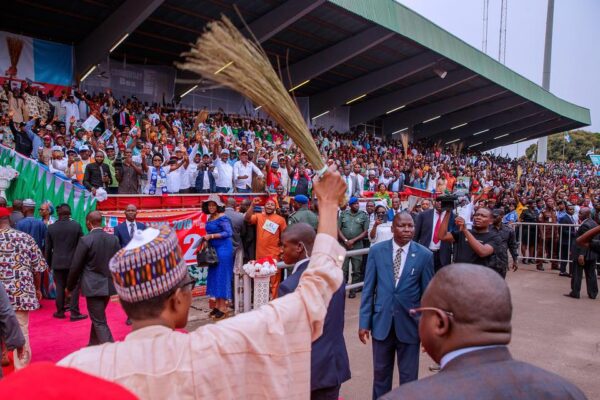Former Nigerian president Muhammadu Buhari passed away on February 13 at the age of 82. The announcement was made by his former spokesperson. A military man turned statesman, authoritarian turned elected president, he marked Nigerian politics for over four decades, leaving a mixed legacy and a country still in search of stability.
From coup leader to statesman
Born in 1942 in the state of Katsina, in northern Nigeria, Muhammadu Buhari was the 23rd child of a traditional Fulani chief. Orphaned at the age of four, he was early on introduced to rigor and discipline, which he further developed at the military academy, and later in the United Kingdom. At 20, he joined the officer cadet school in Mons and quickly climbed the ranks.
His military career led him to the governorship of the Northeast State, and then to the head of the Ministry of Petroleum under the regime of Olusegun Obasanjo. But it was in 1983, at the age of 41, that he abruptly entered history by overthrowing the elected president Shehu Shagari in the name of fighting corruption. He then became the head of state by force of arms, establishing an iron-fisted regime.
At that time, “Buharism” became synonymous with authoritarian order: queues monitored by the military, public humiliations of tardy officials, arrest of critical figures like musician Fela Kuti. The press was muzzled, freedoms severely restricted. This regime, which advocated moral rigor, was overthrown two years later by another military man, General Babangida.
A democratic comeback and a historic alternation
After several years in the wilderness, including three under house arrest, Buhari returned to politics through the ballot box. He failed three times in the presidential elections before triumphing in 2015, becoming the first opposition candidate to defeat a sitting president in Nigeria through the ballot box. A historic turning point.
Elected under the banner of the All Progressives Congress (APC), he promised to end two scourges: endemic corruption and Boko Haram terrorism. But the beginning of his term was difficult. It took him six months to form a government, earning him the nickname “Baba-Go-Slow.” The 2016 recession, linked to the fall in oil prices, further weakened his governance. His long-secret health condition forced him to take long absences from the country.
An authoritarian style that divides
His style of governance, marked by the centralization of power and a small circle of loyalists, has attracted criticism, even within his own family. In 2016, his wife Aisha Buhari told the BBC that she would not support his reelection if he continued to ignore members of his government. He publicly replied that her place was “in the kitchen, the living room, and the bedroom,” causing a diplomatic embarrassment with Angela Merkel.
His second term, which began in 2019, is overshadowed by a rise in insecurity, economic crisis, and ethno-regional tensions. Inflation is rampant, the naira is falling, and kidnappings for ransom are on the rise. In 2020, the #EndSARS movement shook the country after police brutality. The initially peaceful protests turned into chaos. The Lekki massacre in Lagos marked a dark turning point in Buhari’s term.
In 2021, Muhammadu Buhari sparked international outrage by suspending Twitter in Nigeria after the platform deleted two of his tweets deemed threatening. Writer Wole Soyinka then denounced “a dictatorial spasm” incompatible with democratic principles.
This gesture illustrates the Buhari paradox: democratically elected, but loyal to an authoritarian governance, sometimes disconnected from the aspirations of Nigerian youth, eager for freedoms and technological progress.
Mixed legacy
At the end of his life, Muhammadu Buhari leaves behind a complex legacy. He will be remembered in history as the military man turned civilian president, the opposition figure who allowed an unprecedented democratic alternation, but also as a leader whose authoritarian methods and administrative delays fueled frustrations.
While he managed to curb the territorial expansion of Boko Haram, he failed to meet social expectations or establish inclusive governance. His management of the country illustrates the dilemmas of modern Nigeria: between authoritarianism and democracy, between development and inequalities, between national unity and ethnic tensions.
Nigeria will likely pay him an official tribute. But in the streets, reactions will probably be divided, reflecting a man and a journey that have never been unanimous.


